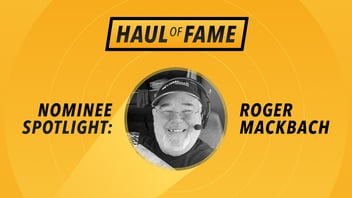Switching gear by switching career
“When I’m assigned new drivers,” says Tom Keen, a dispatcher with Birmingham’s Baggett Transportation, “it never takes them long to figure out that I was a driver myself once."
Tom used to own a company that built cosmetic counters at department stores across the Southeast. After leaving that company before the Great Recession, Tom bought a truck and spent the next seven years in the driver's seat as an owner operator.
In 2012, after 18 months on the road for Baggett, he pulled into the company parking lot one Friday afternoon, and by the time he made it through the door of the office, he knew his driving days were done. Baggett offered him the career change he needed — and it wasn’t long before he was one of their most popular dispatchers.
So why do drivers make the best dispatchers?
Tom shares his first-hand experience
Treat drivers like customers
Having spent much of his previous career selling his company’s services, it’s a philosophy Tom brought to his role as a dispatcher, from day one. “That’s one of my main concerns every day, for every driver I serve. And I do mean serve, because I appreciate how hard that job is. I’m always looking for what’s next, after a driver or team drops off a load. Minimizing driver downtime and dead-head miles is constantly on my mind.“
Always be honest with drivers
“Drivers aren’t hand tools. If you want them to work with you, you have to be honest with them. Particularly with owner operators, because not every load is going to be great, or pay well. Some are going to be downright crappy. But if you tell them the truth, and treat them with respect, they’ll respect you — and they’ll trust you.
“That’s why I can get my drivers to take the occasional bad load, because they know I’ll eventually find them a great load to make up for it.”
The best dispatchers understand drivers from personal experience
”During my driving years, I spent more weekends than I care to remember in truck stop parking lots. Eating fast food. Using dirty showers, when there were showers. And just looking out my window, alone and waiting for my next load.
“If you've never been there, you don’t know what that feels like. And if you're a dispatcher who’s never been there, it might be late Friday afternoon and you're ready to go home. Instead of putting in the extra effort to find a driver a load to get him home, you might just be tempted to think, ‘I’m done for the week.’”
Needless to say, it doesn’t take many long weekends in parking lots to lose a good driver — and when companies conduct exit interviews, it doesn’t take many bad reviews for a dispatcher to lose their job.
Treat drivers like business partners
”I managed the finances for all the companies I owned over the years, so of course I’m always looking for the best-paying loads. But sometimes, and I know this from experience, you’re better off taking the occasional lower-paying load than sitting idle for days.
“You always need to keep a handle on what your drivers are doing and where they’re going next. You also need to think about scheduling their time intelligently. You can't expect someone to drive five hours, unload two hours, then drive six more hours. You have to plan schedules strategically and intelligently.”
Most of all, treat drivers like human beings
"If there’s one thing I learned from my years on the road, drivers hate it when dispatchers won't answer the phone. Now that I’m the dispatcher, I understand. Some drivers are hard to deal with — particularly when you don’t have good news for them. No matter what business you’re in, sometimes you have to deal with difficult people — and ducking a driver’s calls only makes it worse.
“Again, if you plan ahead for your drivers as well as possible, you’re going to make things happen for them — and you’re going to keep their hopes alive during the tough times. Sometimes you just need to let drivers know you're thinking about them. And you know what? Sometimes when drivers call in, they just want someone to talk to — so you’d better learn to be a good listener.”
Finally, don’t forget the little things that can make life better for drivers
There’s another benefit that Baggett drivers enjoy about working with Tom: He has lots of tips for good places to eat. Speaking of which, says Tom, “Next time you’re at the truck stop in Baker City, Oregon, try the cobb salad. And tell them I sent you.”
Are you a dispatcher or a driver that pays lumper fees? Relay Payments provides you with instant, digital lumper and over-the-road payment solutions. Learn more today.


